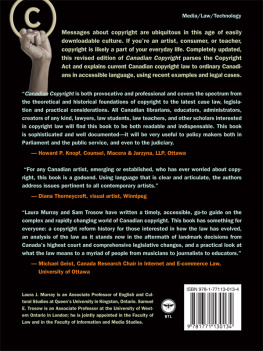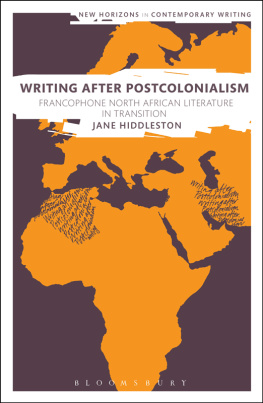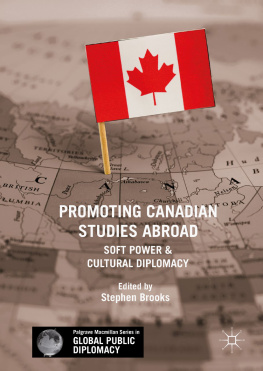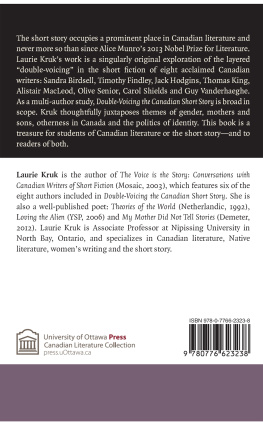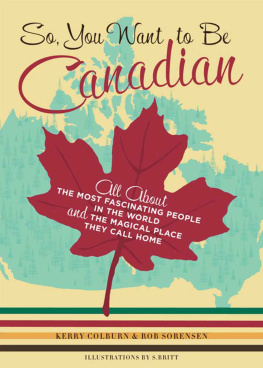Is Canada Postcolonial? Unsettling Canadian Literature
Edited by
LAURA MOSS

This book has been published with the help of a grant from the Canadian Federation for the Humanities and Social Sciences, using funds provided by the Social Sciences and Humanities Research Council of Canada. We acknowledge the support of the Canada Council for the Arts for our publishing program. We acknowledge the financial support of the Government of Canada through the Book Publishing Industry Development Program for our publishing activities.
National Library of Canada Cataloguing in Publication Data
Is Canada postcolonial? : unsettling Canadian literature / edited by Laura Moss
Includes bibliographical references and index.
ISBN 0-88920-416-0
1. Canadian fiction History and criticism. 2. Postcolonialism.
I. Moss, Laura F.E.
(Laura Frances Errington), 1969
PS8077.I8 2003 810.9 971 C2003-902058-4
PR9184.6.I8 2003
2003 Wilfrid Laurier University Press
Waterloo, Ontario, Canada N2L 3C5
www.wlupress.wlu.ca
Second printing 2005.
Cover design by Leslie Macredie. Cover image:
untitled by Cliff Eyland, 2003.
Interior design and layout by Kathy Joslin.
Every reasonable effort has been made to acquire permission for copyright material used in this text, and to acknowledge all such indebtedness accurately. Any errors and omissions called to the publishers attention will be corrected in future printings.

Printed in Canada
No part of this publication may be reproduced, stored in a retrieval system or transmitted, in any form or by any means, without the prior written consent of the publisher or a licence from The Canadian Copyright Licensing Agency (Access Copyright). For an Access Copyright licence, visit www.accesscopyright.ca or call toll free to 1-800-893-5777.
Table of Contents
Laura Moss
George Elliott Clarke
Neil Besner
Diana Brydon
Canada and Postcolonialism:
Questions, Inventories, and Futures
Donna Palmateer Pennee
Looking Elsewhere for Answers to the Postcolonial Question:
From Literary Studies to State Policy in Canada
Susan Gingell
The Absence of Seaming, Or How I Almost Despair of Dancing:
How Postcolonial Are Canadas Literary Institutions
and Critical Practices?
Judith Leggatt
Native Writing, Academic Theory: Post-colonialism
across the Cultural Divide
Mridula Nath Chakraborty
Chelva Kanaganayakam
Cool Dots and a Hybrid Scarborough:
Multiculturalism as Canadian Myth
Pam Perkins
Imagining Eighteenth-Century Quebec:
British Literature and Colonial Rhetoric
Douglas Ivison
Cecily Devereux
Are We There Yet? Reading the Post-Colonial and
The Imperialist in Canada
Barbara S. Bruce
Figures of Collection and (Post)Colonial Processes in
Major John Richardsons Wacousta and
Thomas Kings Truth and Bright Water
Manina Jones
Stolen Life? Reading through Two Is in Postcolonial
Collaborative Autobiography
Karen E. Macfarlane
A Place to Stand On: (Post)colonial Identity in
The Diviners and The Rain Child
Amy Kroeker
A Place Through Language: Postcolonial Implications
of Mennonite/s Writing in Western Canada
Jim Zucchero
Whats Immigration Got to Do with It? Postcolonialism and
Shifting Notions of Exile in Nino Riccis Italian-Canadians
Marie Vautier
Robert Budde
After Postcolonialism: Migrant Lines and the Politics of Form
in Fred Wah, M. Nourbese Philip, and Roy Miki
Len Findlay
Terry Goldie
Victor J. Ramraj
Stephen Slemon
LAURA MOSS
Preface
Is Canada Postcolonial? Unsettling Canadian Literature
I first posed the question Is Canada Postcolonial? in a paper at the 1999 Association of Canadian College and University Teachers of English (accute) Conference in Sherbrooke, Quebec. Since the topic was clearly beyond the scope of a single paper, the Is Canada Postcolonial? Conference was organized in 2000 at the University of Manitoba. In the call for papers beside the central Is Canada Postcolonial? question, several other related questions were also suggested for possible consideration. These included: Do theories associated with postcolonialismsuch as those concerned with marginality, power, alterity, resistance, and historical revisionismapply constructively into a Canadian context? Is postcolonial theory in Canada racially or culturally grounded? What is the nature of postcoloniality in a global economic situation? Are some Canadian writers more postcolonial than others? Can postcolonial theory be fruitfully applied to First Nations literatures? Is it possible for the discussion of postcoloniality to go beyond contemporary writing to include writing from earlier times? (Or, is The History of Emily Montague postcolonial?) What is gained for the literature of Canada by conferring or denying postcolonial status? Many of these questions were debated at the conference. Some participants chose to approach the questions through close readings of individual texts, while others chose to directly address the intersection of postcolonial theory and Canadian literary culture. There were a surprising number of papers interested in nineteenth-century Canadian literary works and a not very surprising focus on literature by First Nations writers. Most of the papers in this collection began at the conference.
The conference, however, was only the starting point of discussion for the participants. Since the fall of 2000, participants have been in dialogue with one another and carried on the discussions begun in Winnipeg. The essays of those present at the conference have been substantially revised in light of the lively debate and the rigorous comments of the audience, and in light of the comments by the readers who reviewed their papers for this collection. As well, the collection introduces a few new voices into the mix. George Elliott Clarkes essay, for example, speaks to an editorial desire to widen the terms of discussion and the parameters of Canadian literature.
The collection is driven by a shared concern with the place of Canadian literature in ever-evolving literary theories and the place of Canada in theories and practices of nationalism, postnationalism, and postcolonialism. Such places, however, differ for each of the authors. I have encouraged diversity instead of superimposing some kind of unifying critical methodology. Each paper addresses the question Is Canada Postcolonial? either in brief or in full. The responses to the question range from the wholehearted inclusion of Canada and the other invader-settler countries in postcolonial studies to a vehement rejection of examining these contexts in such terms. No two contributors seem to agree on precisely what Canada and, more contentiously, postcolonial mean or what the answers might be. I have chosen not to standardize the spelling of postcolonial, post-colonial, or post-Colonial because the subtle distinctions (the hyphen and choice of case) are telling reminders of the variety of definitions of the word at work in the collection.rethinks history in colonial and chronologically post-colonial works of fiction and poetry; examines constructions of race and ethnicity in poetry and prose; explores the flawed memory of Canadians; differentiates between multicultural policy and practice; undergoes canonical revision; and writes back to colonial education. W.H. New begins his chapter on Canada in his 1975 introduction to Commonwealth and South African literature,


